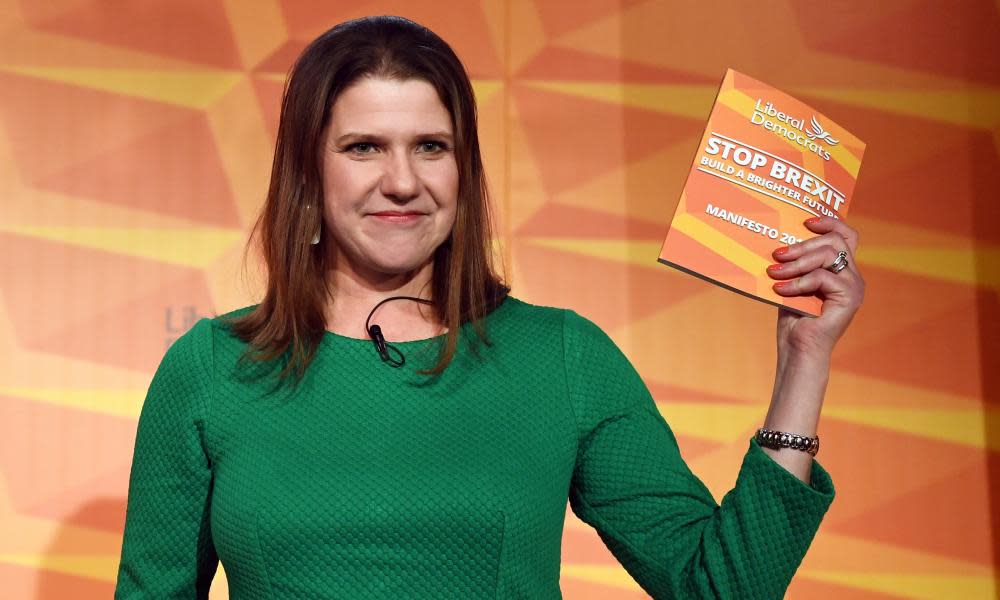Liberal Democrat manifesto: key policies explained

Brexit
A majority Lib Dem government would revoke article 50 and ensure Britain stays in the EU. In other circumstances, they would champion a second referendum with the option of staying in Europe, which they would actively campaign for. They describe Brexit as a “national humiliation” that ultimately costs the NHS, public services, scientific collaboration, peace in Northern Ireland and the ability to tackle climate change. But their “remain bonus” of £50bn is the basis for a lot of the manifesto’s spending commitments, and this pot of money comes from forecasts of higher growth for the UK economy in a remain scenario. Their votes at 16 policy would also come into play if there was another Brexit vote.
Education
Jo Swinson has made much of her party’s offer for children and families and education makes up the lengthiest portion of the manifesto. Headline-grabbing policies are plugging the gap in childcare for working parents by offering free hours between nine months and two years old. They would triple the early years pupil premium to help the most disadvantaged children, scrap Sats exams, hire 20,000 more teachers and pay new recruits a starting salary of £30,000. Michael Gove’s legacy education policy, the Ebacc, would also be scrapped. A form of the popular education maintenance allowance would make a return in the form of a new “young people’s premium”, a portion of which would go to 16-18-year-olds directly.
Health
A £7bn cash injection for the NHS and social care would be raised by putting 1p on income tax. Meanwhile, they would begin developing a new health and care tax. This would bring together both funding streams into one collective budget and the tax would show up on people’s payslips. New mums in England would be given Finnish-style baby boxes, which have been popular in Scotland. Mental health policies make up a significant portion of their health plans, including free prescriptions for those with chronic mental health conditions and new waiting time standards in children’s services and for those with eating disorders and severe conditions.
Immigration
They do not give a figure for a net migration target, focusing instead on a raft of what they call “anti-hostile environment” policies. By stopping Brexit, they claim they would protect freedom of movement with EU countries. Power over work permits and student visas would be removed from the Home Office and given instead to the departments for education and business. Families registering a child as a British citizen would only have to pay the administration fee and not the current £1,012 fee. Policies for asylum seekers and refugees include a 28-day limit on immigration detention, giving asylum seekers the right to work after three months, and resettling 10,000 unaccompanied refugee children.
Economy/tax
Billing themselves as the party of “fiscal rectitude”, the Lib Dems plan a £130bn infrastructure investment for public transport improvement, 300,000 new homes a year by 2024, and hyper-fast broadband. Reforms of the tax system involve hikes on corporation tax from 17% to 20% and replacing business rates with a commercial landowner levy. This tax removes physical buildings from calculations and instead applies the levy to the overall land value of a commercial site. An idea borrowed from New Zealand – the wellbeing budget – would prioritise spending on mental health, care for children in schools, homelessness and exploitation. Their £10,000-per-adult “skills wallet” comes from this budget and would be paid out at different stages of people’s lives for education and training.

Crime and justice
A flagship policy is the legalisation of cannabis. They claim this could bring £1.5bn in duty and savings through sales in licensed shops to over-18s. Community policing is also a significant focus, with a promise of £1bn investment to put two new police officers in every ward. Officers would get an immediate 2% pay rise. The Tory initiative of police and crime commissioners would be scrapped, with scrutiny of policing transferred to police boards made up of local councillors. The over-representation of people from BAME backgrounds in prison would be studied in more detail with a new uniform data system recording ethnicity and publishing details publicly.
Environment
Ambitious policies to try to tackle the climate emergency by 2030 include the insulation of all of Britain’s homes, generating 80% of UK electricity from renewable sources, and making sure all new cars are electric. Their legally binding target to achieve net-zero emissions is 2045, which is five years below the Tories but far higher than the pledges made by Labour and the Greens. A new Whitehall Department of Climate Change and Natural Resources and a sustainability minister embedded in the Treasury would ensure targets were adhered to, they claim, but make significant warnings that Labour’s nationalisation of utilities would be a far too costly way of achieving a cleaner environment. Instead they say they favour “tougher regulation”. Reforms to air passenger duty are likely to hit frequent flyers with a new tax, and this is predicted to raise £4.8bn.
Foreign policy
Possibly the scantiest part of their manifesto. Alongside continued support for the UN and Nato, their biggest move is a ban on arms sales to Saudi Arabia. Topically, citizens in Hong Kong would be able to apply for the reopened British national overseas passport scheme with the right to live in the UK. They describe the EU as being a key partner in trying to revive the Iran nuclear deal and back a two-state solution for Palestine and Israel. Overseas aid spending would be 0.7% of gross national income – the current government level.
Defence
They stick with the government’s current 2% of GDP spending on defence, while pledging to maintain a minimum nuclear deterrent. Yet rather than implementing the Trident system with four Dreadnought submarines, they would have three. Critical skills shortages in the armed forces would be addressed by giving graduates in Stem subjects £10,000 one-off payments to become armed forces engineers.

 Yahoo News
Yahoo News 
